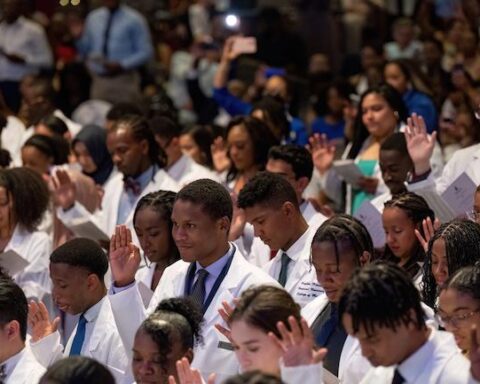By Brooke Brinson
During the short white coat ceremony to welcome new medical students, Howard University College of Medicine Dean Andrea Hayes Dixon said she hoped that the future of medicine would be less about the color of the doctor’s skin and more about how they could provide healing and treatment.
“I hope there comes a day when people will be blinded by the white coat and not the color of your skin. The white coat should help people understand trust and knowledge,” said Dixon, who made the remarks during the college’s 26th annual short white coat ceremony on July 21.
The event marks the start of the medical school journey for students who will go on to become the nation’s next generation of doctors. At the events, eager students beamed with pride as students crossed the stage and stood as College of Medicine faculty and parents put white jackets onto the students.
With her appointment last year, Hayes Dixon became the first Black woman to serve as dean of the Howard University College of Medicine. In 2004, Hayes Dixon became the first African American woman in the nation to become a board-certified pediatric surgeon. In 2006, she became the first surgeon in the world to perform a high-risk, life-saving procedure in teens with rare forms of abdominal cancer. At the ceremony, she spoke about her own challenges as a Black physician, including having her qualifications challenged by families because of her race.
“Our medical students will have the opportunity to work with and heal patients who look like you,” said Dixon.
Currently in the United States, only 5% of practicing physicians are Black, yet data shows that Black patients have better health outcomes when being treated by Black doctors. More Black doctors means more Black lives will be saved, as well as a reduction of the health issues that end up suppressing economic opportunity in Black communities.
As one of the first events of the school year, the ceremony introduces incoming medical students to the Howard University community, with many students hailing from different regions of the country and around the world.
Zyare Orr, a graduate of Augusta University in Georgia, smiled as he received his short white coat. He said he hoped to become an emergency medicine physician. Orr expressed how empowered he felt after recovering his white coat to start his journey to helping heal others.
“My biggest fear was that if I needed emergency medical attention the last thing, I want to worry about is that my physician can’t give me the care I need because they can’t identify with me,” said Orr.
Nakiah Jipson, a graduate of Tuskegee University in Alabama, said she and other first-year medical students received the Dixon’s message and agreed on the need for more Black doctors.
“I want to help bridge the gap in health disparities among people in underserved communities, and we need more Black doctors to do that,” Jipson said.


